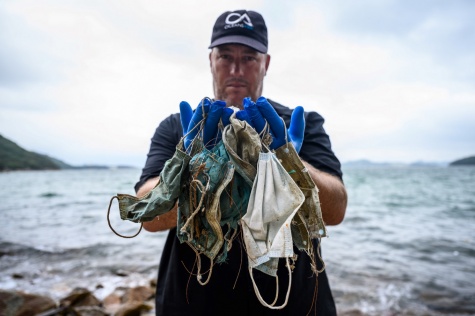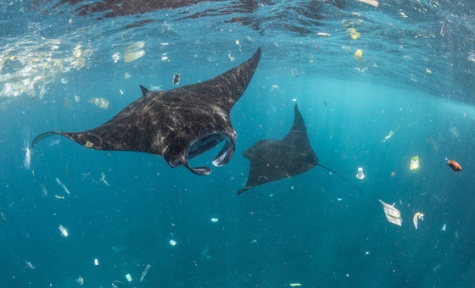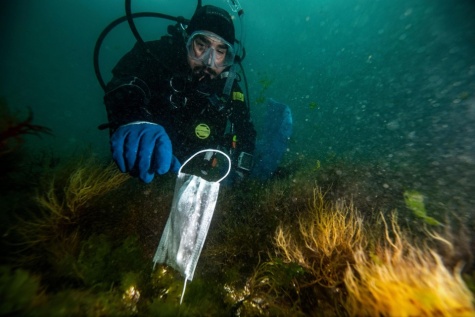
By Reaghan Mulligan | Opinion Editor
October 7, 2020
At the height of this pandemic, with over thirty-five million infections worldwide, sales of personal protective equipment (PPE) have reached an all time high. Common PPE items seen daily include single use masks, reusable masks, and disposable gloves. These items, although cheap, come at a larger cost to the environment. Though we may not recognize the detrimental impact of the mass production, and in turn, mass disposal of these currently vital items just yet, the environment is already feeling the brunt of this situation.
The demands of the pandemic have resulted in the production of millions of masks, and no clear way to dispose of the items when they are no longer needed. Many medical facilities use incinerators to burn masks and other sterilized equipment; however, most regions lack the resources to burn every mask used by the public. The masks are plastic based, liquid resistant equipment, meaning that any lack of proper disposal will most definitely lead to those masks lying around for extensive periods of time, with no way of deterioration.
“We have to get out of the mindset of being such a disposable society,” Mrs. Brislen, the IB Marine Science teacher said. “We consume and waste, whereas other places are going to make things last.”
Many people presently own at least four or five masks, whether they be from a package of single use surgical masks or cloth masks bought from the store. By using cloth masks, one already reduces the amount of disposal occurring in comparison to the utilization of masks meant to be disposed of after a day’s use.
“When you suddenly have a population of 7 million people wearing one to two masks per day, the amount of trash generated is going to be substantial,” Gary Stokes, founder and director of the ocean-centered Non-governmental organization (NGO) OceanAsia, said in an Earth.Org article.
The surgical masks’ short term intentions prove to add up to a significant amount of pollution. According to the United Nations Environment’s 2018 estimate, around thirteen million tons of plastic enter the world’s oceans annually. With the harsh influx of plastic consumption due to the pandemic, we should expect to see these numbers increase dramatically. Researchers in Hong Kong already notice a stark increase in the number of masks littering the shores of the Soko Islands. Horrifically, in the city of Wuhan, reporters calculated over 200 tons of clinical waste generated in a single day in February. United Nations News predicts that around 75 percent of used and discarded masks will find home in landfills, or possibly float in the sea like plastic jellyfish.
“I have seen more than enough masks on the ground, in the ocean, in bushes, and practically everywhere,” sophomore Kayla McLaughlin said, disturbed at the sheer masses of disposed masks left aimlessly forgotten on the ground around town.

Despite the benefit of health safety the masks propose to humans, incorrectly discarded masks pose an immense threat to wildlife and marine ecosystems. Due to insufficient means of disposing these protective face masks, animals in their natural habitat may encounter floating masks and mistake them for food. Additionally, these marine animals could potentially become entangled in the straps of masks, possibly leading to the animals’ death.
“A single face mask could take hundreds of years to break down into micro plastic,” OceanAsia, a Hong Kong environmental organization, said. “The kind of micro plastic is now being found in fish destined for human consumption, sea salt and even sea spray.”
Eventually, these consumed chemical fragments travel up the food chain through the stomachs of consumers and land themselves on the plates we eat at restaurants.
“We’ve seen the harms of plastic packaging strangling sea animals, but now we’re seeing something different and just as horrible, with birds’ feet being locked together by discarded masks,” junior Bethany Padilla said. “The production of masks should be very harmful to our environment and will lead to too many masks popping up on trash infested shores rather than properly disposed of in the trash.”

A French non-profit organization, Opération Mer Propre (Operation Clean Sea), began recognizing the looming issues of mask pollution after finding a multitude of “Covid waste” in the Mediterranean Sea. Although the beginning of the pollution seems small in the moment, once the pandemic runs its course, the results of incorrect disposal will be prominent in our landfills and oceans.
The ecological timestamp of these masks due to their extensively long lifespan—450 years according to French politician Éric Pauget—are an “ecological time bomb given their lasting environmental consequences for our planet.”
Simple steps can be taken by each and every one of us in order to reduce our ecological footprint. Investing in reusable masks greatly decreases the number of disposals made, overall decreasing the surge of single-use waste.

Leave a Reply